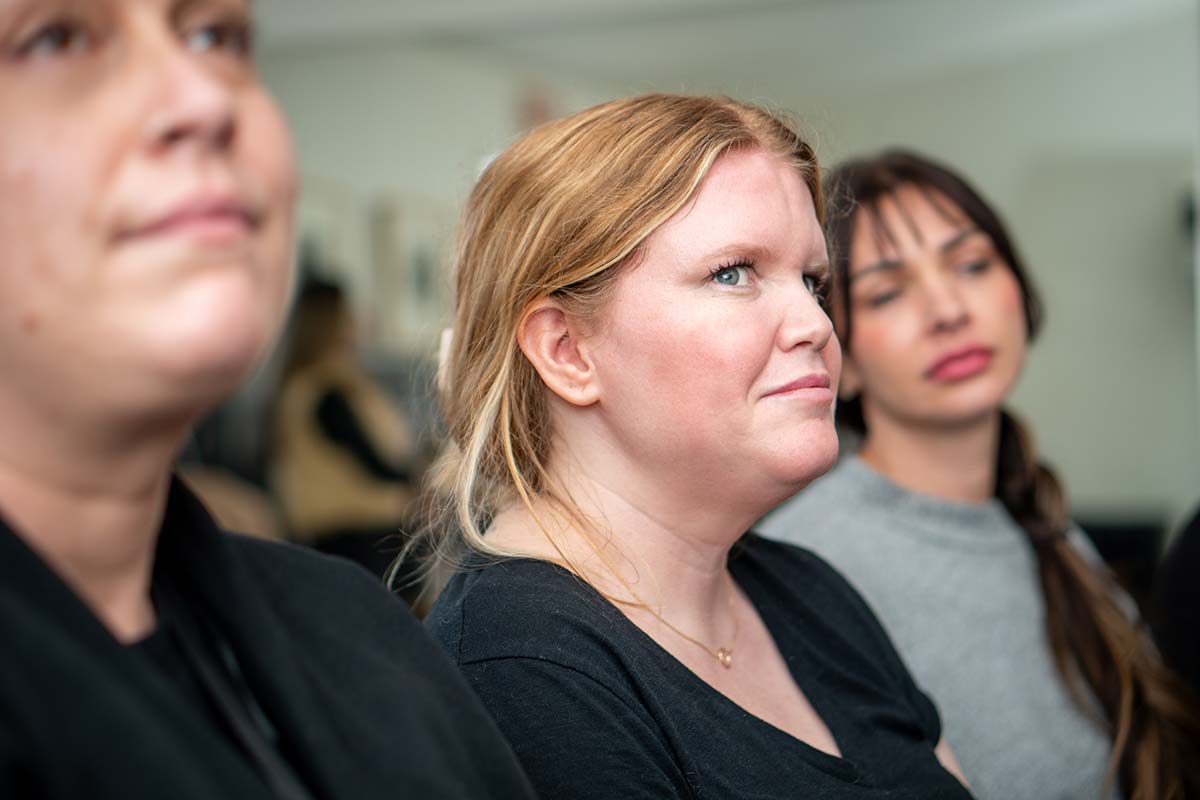Discovering that your child needs help with a substance use disorder (SUD) can be very frightening and overwhelming. Many parents immediately beat themselves up when they learn their child is a person with an addiction. There is a struggle between supporting your child and not enabling her destructive addiction.
Does She Show Signs of Addiction?
Family members need to recognize the signs and symptoms of addiction. Depending on the type of addiction, these can be different. Whether it is drugs, alcohol, or gambling, many people hide their addiction even from those closest to them. Often it is tempting to ignore the problem when that seems easier. Some of the most common signs that your daughter is suffering from addiction include:
 Behavioral Changes
Behavioral Changes
- Developing problems at work or school
- Lying about the substance or how much she uses
- Anger when asked about substance use
- Mood swings or changes in normal habits
- Dropping out of social activities
- Criminal behavior
Physical Changes
- Appearing intoxicated more often
- Memory and cognition problems
- Unusually tired
- Bloodshot eyes
- Rapid changes in weight
- Poor grooming and hygiene
Seven Truths About Children with Addiction
Until you learn the truth, you won’t be able to find peace with yourself or be able to help your daughter. Accepting the truth and going from there will allow you to help both yourself and your child.
Parents Can Be Enablers
We all love our children and would do anything we can to stop the pain they’re in. We would do anything to end the addiction and ease the road ahead of them. We would even give our lives if it would help. At some point, your daughter made certain decisions that led her in this direction. But in the long run, all we can do is support her and provide different opportunities to help her make the right decisions in life.
That is why different role models such as sponsors and other women in recovery, should help the person struggling with addiction to find the right path. Unfortunately, this is a difficult thing to do. We can’t always do
what they need when they need it. We can’t always prevent them from hurting. They need to experience the consequences of their actions to get better.
Parents Can’t “Fix” the Problem on Their Own
Addiction is a problem only the person with the addiction can fix. This can be difficult for parents to accept because they try to fix everything. However, your child is the only person that can decide to change her life, for better or worse.
The addiction won’t end until she decides to end it. Frequently, parents try to make the decision and it only ends up in more frustration and failure. All you can do is encourage her to get treatment and let her come to the decision herself.
A Person with Addiction Might Lie
People with substance use disorder (SUD) will say anything to hide their addiction. Some don’t even realize they are lying but will say whatever they think their parents want to hear. Children want approval from their parents and want to make them proud.
Many people struggling with addiction don’t even approve of what they are doing but feel like there is no way out of it. In this case, their only way to survive is to seed approval from their parents even if it’s not true. So, if your daughter tells you she isn’t using substances, don’t believe what you hear. Instead, believe what you see. And if you see her doing something positive, like telling the truth, give her positive reinforcement.
A Person with Addiction Might Break the Law
Illegal activity can be a symptom of addiction. When you hear of someone who is incarcerated, you probably think they deserve to be there. But your baby is not like that, right? Every person is someone’s child and your daughter may do things that result in jail time. This is just part of the consequences of addiction that you can’t save her from, only discourage her from.
Other People Might Not Want to be Around Someone with Addiction
Your child might have wronged some people. And it is alright to be uncomfortable around someone who uses substances. You are her family and it is your unconditional love that keeps you on her side. However, it’s not wrong for other people to have their own feelings about the situation and make their decision to keep their distance.
Your Life Will Not Be the Same
 You might grieve for the loss of that cute little girl playing with her Barbies and would give anything to get her back. It’s okay to grieve this loss but it won’t help either of you if you don’t move forward.
You might grieve for the loss of that cute little girl playing with her Barbies and would give anything to get her back. It’s okay to grieve this loss but it won’t help either of you if you don’t move forward.
People with an addiction don’t live in the past or the future. They live right here, right now. And if you want to help someone who is suffering from addiction, you need to live in the same world and try to understand where they are coming from.
A Person with Addiction Might Choose Homelessness
When you drive downtown, you probably see people living on the streets and under bridges, holding signs asking for food or money. They are someone’s sons, daughters, brothers, or sisters. You can try to encourage her to get help, but you can’t make her change if she has decided to live this way.
How to Deal with a
Drug Addict Daughter
Behavioral Changes
Problems at School/Work
Getting Angry or Lying About Drug Use
Physical Changes
Mood Swings or Change in Behavior
Criminal Behavior
Do's and Don'ts for Dealing with Your Daughter
Do:
- Keep your own balance/integrity
- Find a treatment program for her
- Stand by her if you can
- Stage an intervention
Don't:
- Let her convince you, you're wrong
- Choose a time-limited program
- Allow for an abusive situation
- Expect immediate action from her
Do’s and Don’ts for Dealing With Daughter’s Substance Use Disorder
More than 23 million Americans are struggling with drug or alcohol use dependency. So there are many millions of more families and other loved ones suffering along with them. A survey reported that 64% of people have experienced addiction in someone close to them. This makes it important to have some guidelines when dealing with an addicted person, even your daughter.
These are some Do’s and Don’ts to help you in this crisis:
- Do: keep your own balance and integrity.
- Don’t: let her convince you that you’re wrong for seeing the problem.
- Don’t: expect results just by asking her to quit. It rarely does any good to say “If you love me, you’ll quit.” The desire to get more alcohol or drugs is bigger than she is and it’s usually bigger than her love for her family.
Treatment
- Do: find a treatment program for her. If you have a choice, ask plenty of questions before choosing one.
- Don’t: choose a time-limited 30-day program. The National Institute on Drug Abuse suggests a longer program for a better chance of long-term recovery. The process of addiction seldom happens overnight and there is a lot of destruction of life skills along the way. It will take time to rebuild.
- Do: if at all possible stand by your daughter. Let her know that you support her and her recovery. The drug or alcohol use has already convinced her that she is worthless.
Support
- Don’t: let yourself be in a situation where you can be abused mentally or physically. If you are open to attack due to size, emotional state, or any other reason, find your own support. Don’t feel ashamed or embarrassed to be in that situation. You can’t help if you are beaten down or ill.
- Do: insist on rehab as the answer to addiction. Families with a person struggling with addiction live in fear of the phone call that informs them of the incarceration or death of their loved one. Find a rehab program and make it the only solution you will accept.
Intervention
- Don’t: expect that she will go immediately to a treatment center when you first approach the subject. You might have to intervene with a professional interventionist. Get together with your family and her friends and reach an agreement that treatment is the only option. If someone has been providing her money or shelter, it must be stopped.
- Do: stage an intervention out of caring and love. Criticism and blame will only push her further into guilt and drugs are already her solution for guilt.
- Don’t: assume that going to rehab means that everything has been solved. She will need your love, guidance, and support during and after treatment. Help her move back into a drug-free life in a step-by-step manner, maintaining your support.
Take Care of Yourself First
Harvard Medical School published a report on drug abuse and pointed out that loved ones must take care of themselves first, similar to putting on your oxygen mask first before you help anyone else. This is important in learning to cope with the addiction of your child. If you make yourself ill over the addiction, it will not put an end to its progress.
A Treatment Center That Understands How to deal With A Drug Addict Daughter
 New Directions for Women welcomes all women who need help with a chemical dependency. We are a women-only treatment center with an experienced staff of licensed professionals and certified substance use counselors. Our treatment approach includes four levels of care and a detox program. This means that your daughter can enter treatment at the right intensity for the severity of her addiction.
New Directions for Women welcomes all women who need help with a chemical dependency. We are a women-only treatment center with an experienced staff of licensed professionals and certified substance use counselors. Our treatment approach includes four levels of care and a detox program. This means that your daughter can enter treatment at the right intensity for the severity of her addiction.
New Directions understands women of all ages. And many times, women are uncomfortable in mixed-gender groups for personal reasons. Sometimes, the reason is why they started using drugs in the first place. Contact us now. We will be happy to answer your questions. When the time comes, we are here to help.
